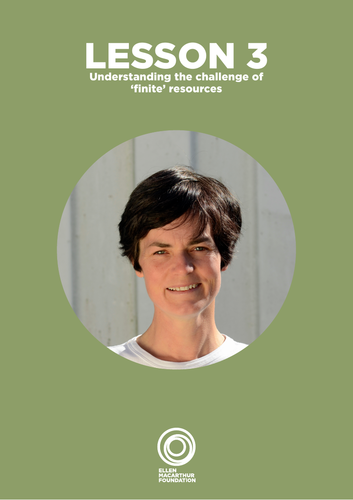

This lesson is part of a 5-part series introducing the circular economy and systems thinking. The circular economy refers to an industrial economy that is restorative by intention. It aims to rely on renewable energy, minimise the use of toxic chemicals, and eradicate waste through careful design. It involves careful management of material and resource flows which is explored in this lesson.
This lesson focuses on understanding the challenge ‘finite’ resources. Students will be able to understand the urgent challenge that finite resources pose, explore economic history since the industrial revolution, and critically evaluate our current consumption and production systems. Through this they can explore sustainability and better ways of dealing with resources.
Subjects: Economics, Geography, Environmental Systems, Sociology, Business,
Citizenship
Age range: 12-19 years
Total time: 45-70 minutes
Learning outcomes:
• To understand the urgent challenge that finite resources pose to our current
economic system
• To explore economic history since the industrial revolution through personal
narrative
• To critically evaluate our current consumption and production systems and
explore better ways of dealing with resources
About the Circular Economy
The circular economy is a new way to design, make, and use things within the limits of our planet. In the natural world, materials and nutrients cycle continuously, allowing the Earth’s biosphere to regenerate and for all lifeforms - humans included - to flourish. This insight lies at the heart of the circular economy. Instead of using things for a short time before throwing them away, in a circular economy everything is designed to fit within a cycle so it can be used again and again.
The concept is based on three principles, driven by design, and underpinned by a transition to renewable energy:
1 - Eliminate waste and pollution
2 - Keep products and materials in use
3 - Regenerate natural systems
Using these principles, we can create a system that restores biodiversity, addresses climate change, and makes the most of our planet’s limited resources. Such a system could work for the economy, society, and environment - making it a truly sustainable model for our future prosperity.
About The Ellen MacArthur Foundation
The Ellen MacArthur Foundation, an international charity, develops and promotes the idea of a circular economy in order to tackle some of the biggest challenges of our time, such as plastic pollution, climate change, and biodiversity loss. We work with, and aim to inspire, business, academia, policymakers, and institutions to mobilise systems solutions at scale, globally.
Something went wrong, please try again later.
This resource hasn't been reviewed yet
To ensure quality for our reviews, only customers who have downloaded this resource can review it
Report this resourceto let us know if it violates our terms and conditions.
Our customer service team will review your report and will be in touch.